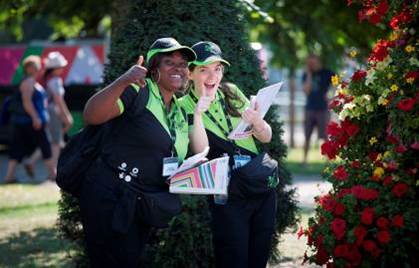Games time experiences: the main conclusions
|
The volunteers found it to an overwhelmingly positive experience, with 89% (179 respondents) satisfied overall with their role as a HCV, and 95% indicating agreement that they had been proud to have been a HCV. The best things about the experience were ‘meeting people’ (78%), being part of Glasgow (50%), as well as helping people, the atmosphere of the city, and being part of the Games 15% of respondents indicated that they had a disability and the inclusive and supportive environment of the teams helped them to feel valued and raised awareness of their contribution to the Games |
15% of the respondents had not previously been involved in a volunteer capacity and each of them found the experience positive enough to suggest that they would volunteer at another event in Glasgow if asked and 88% that they would get involved in a local community event if asked.
The HCVs were motivated to get involved by the unique opportunity provided by the Commonwealth Games and the opportunity to socialise/have fun through meeting people but also by the role providing an opportunity to learn more about or impart existing knowledge of Glasgow. In turn their aspirations included acquiring new skills or experience, gaining confidence in themselves and adding to their social networks or generating memories with others.
The ‘light touch’ training associated with the pre-Games preparation was appropriate in instilling a sense of pride and confidence in the volunteers, and most commented that it was suitable in delivering the essential elements of the role during the Games. More specific information relating to venues and location either at training or during the Games would have helped some HCVs.
The development of teams was supported by training and by most team leaders, but some of the team leaders lacked the expertise, knowledge and managerial experience to help support all members of the teams.
The failure to recognise the contribution of the HCVs at the Closing Ceremony and more generally by other Games bodies beyond those involved in Glasgow Life meant that many HCVs felt their role was devalued, especially in comparison with the Clyde-siders who were frequently mentioned.
The HCVs were motivated to get involved by the unique opportunity provided by the Commonwealth Games and the opportunity to socialise/have fun through meeting people but also by the role providing an opportunity to learn more about or impart existing knowledge of Glasgow. In turn their aspirations included acquiring new skills or experience, gaining confidence in themselves and adding to their social networks or generating memories with others.
The ‘light touch’ training associated with the pre-Games preparation was appropriate in instilling a sense of pride and confidence in the volunteers, and most commented that it was suitable in delivering the essential elements of the role during the Games. More specific information relating to venues and location either at training or during the Games would have helped some HCVs.
The development of teams was supported by training and by most team leaders, but some of the team leaders lacked the expertise, knowledge and managerial experience to help support all members of the teams.
The failure to recognise the contribution of the HCVs at the Closing Ceremony and more generally by other Games bodies beyond those involved in Glasgow Life meant that many HCVs felt their role was devalued, especially in comparison with the Clyde-siders who were frequently mentioned.

